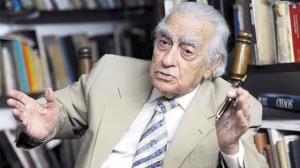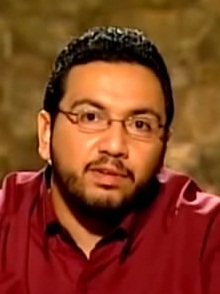One columnist refers to Sayyid Qutb’s writings to highlight how civilization will be destroyed and another comments on Brazil’s path to economic reform.
Dr Murad Wahba
Either civilisation or the Muslim Brotherhood
Al Masry Al Youm
Dr Murad Wahba addressed the writings of Sayyid Qutb, who was an Islamic theorist for the Muslim Brotherhood. Dr Wahba begins the column by explaining its title “holds within it a contradiction between two poles, each wants to exclude the other to the extent of demanding its annihilation”. He asks which civilization that the Ikhwan wants to annihilate and how the annihilation would come to happen.
He then seeks the answer in the writings of Sayyid Qutb, whom “Abdel Nasser thought that with Qutb’s execution in 1966, he would have executed the Muslim Brotherhood, but ideas can’t be executed”. He mentions that the continuation of Qutb’s theories is proof of that.
He adds that “with civilization, Sayyid Qutb meant the civilization of the white man, whether American or Russian, and that it is a barbaric civilization because it has been inflicted with a disease which he calls ‘petulant schizophrenia’”. Dr Wahba explains that schizophrenia means “mental withdrawal from the outside world, and the retirement in the world of fantasies. Petulant means it is of little benefit”.
Dr Wahba also discusses the reasons that led Qutb to this conclusion, which are mentioned in the columnist’s book, The Future of This Religion. Qutb believes that the conditions that led to that type of schizophrenia existed in three eras: the renaissance, enlightenment and industrialisation. He relates the three eras to humans refusing divine structure.
In his book Islam and Problems of Civilization, Qutb concludes that the Islamic society is “the only road to salvation for humanity”, the columnist states. Dr Wahba then lists the conditions of the Islamic society that Qutb mentioned. Such society doesn’t have legislative rules because “it doesn’t have the problems of a barbaric civilization”.
He then discusses how the Muslim Brotherhood plans to annihilate Western Civilization. He says: “The answer to that question depends on Mohamed Morsi… as well as Sayyid Qutb’s ideology.” He mentions that Morsi has entered a “tense relationship with the Egyptian army because it has an organic relationship with the United States, which is the product of the barbaric Western Civilization”. Then, Dr Wahbi states, President Morsi “clashed with the judicial authority to push it to collapse because it is built upon man-made law rather than divine law”.
He concludes that Qutb’s civilization leads to the death of logical reasoning in preparation for the Islamic society envisioned by the Muslim Brotherhood.
Belal Fadl
It’s emotional intelligence, stupid
Al-Shorouk newspaper
Belal Fadl addresses the issue of Morsi travelling to Brazil. He laments Morsi going there for aid since this year has been one of the worst economically for Brazil. He deduces that the president is going in an attempt to copy the Brazilian experience but warns that he won’t be able to copy such policies in order to lead Egypt to become economically viable like Brazil, because Lula da Silva depended on emotional intelligence.
He mentions Perry Anderson’s study on Lula da Silva that was published in the London Review of Books. He notes that historians have found it nearly impossible for rulers to be more popular at the end of their reign than at the beginning of their reign. However, Lula da Silva was able to leave the presidency with over 80% of his people satisfied with his performance. Anderson concluded that this success was achieved through the Brazilian leader’s sensitive social capability and sound political calculations.
Lula da Silva’s success wasn’t guaranteed, as he witnessed great economic challenges in 2002 when he first became president. Fadl notes that Lula da Silva didn’t issue any constitutional declarations with which to split his people, and he didn’t seek to suppress his people. As the debt increased, former allies of the previous Brazilian president, Fernando Cardoso, started to gloat about da Silva’s failure. He also suffered a scandal two years after being elected, when some of his aides were involved in a case of buying electoral votes, among other issues.
However, da Silva remained as president. Fadl adds that he was saved by two factors: he had a realistic plan that made it hard for his enemies to strike him, and he also had emotional intelligence which enabled him to make a difference in people’s lives without suppressing them. He was able to garner great public popularity, which protected him from the alliance of political and media entities that stood against him.





